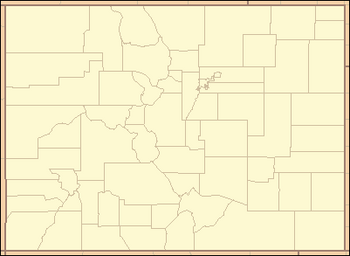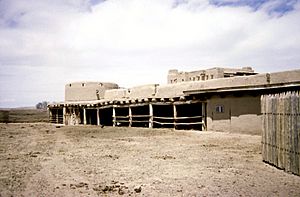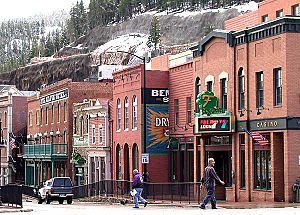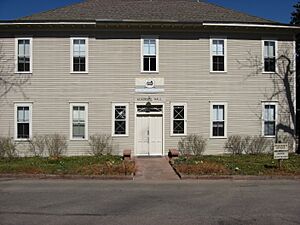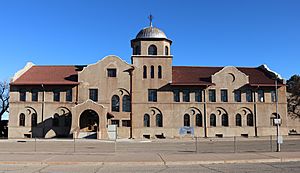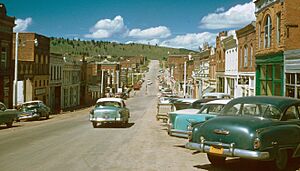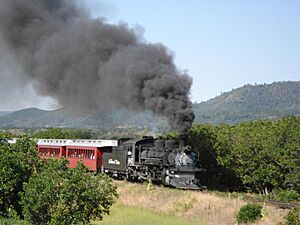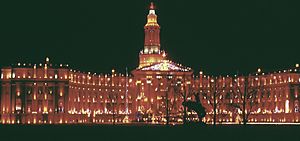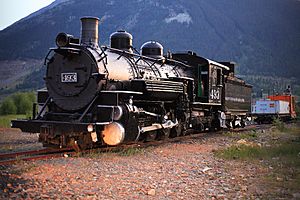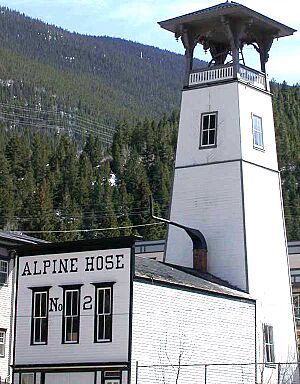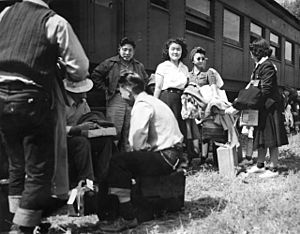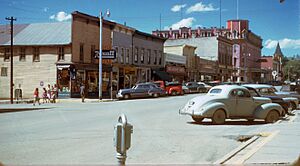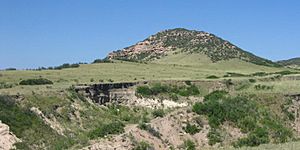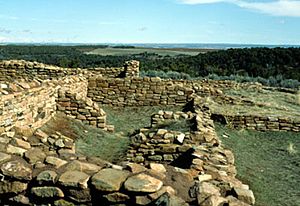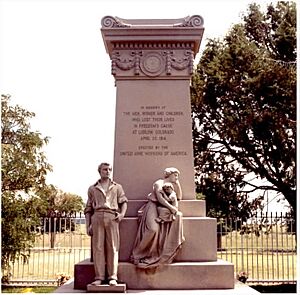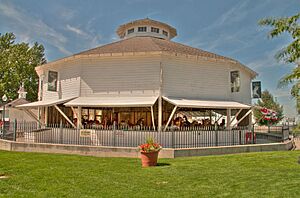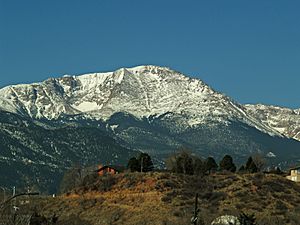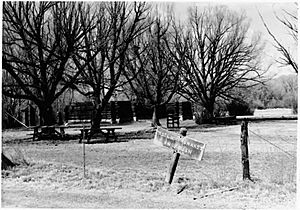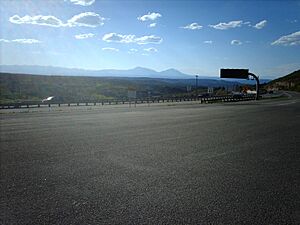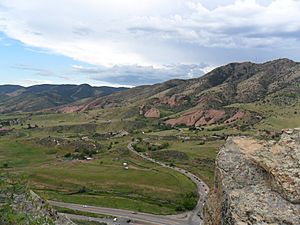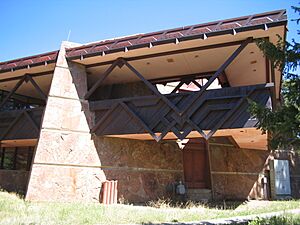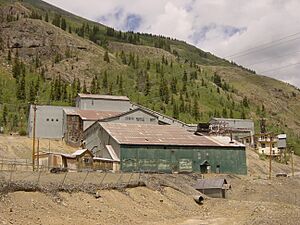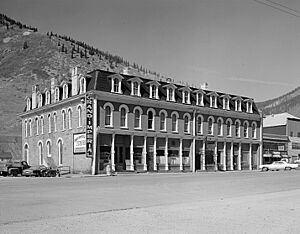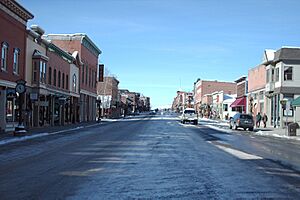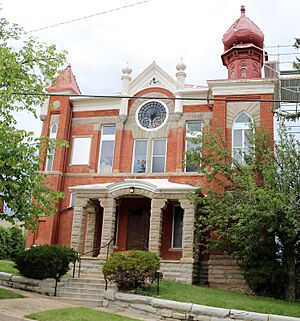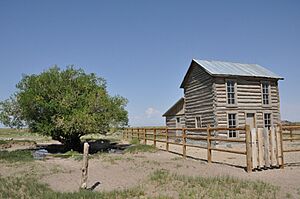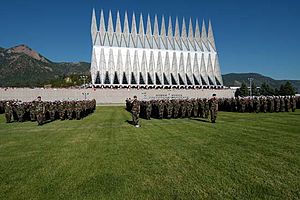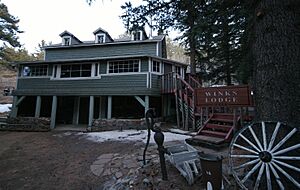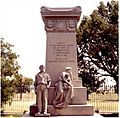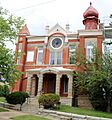List of National Historic Landmarks in Colorado facts for kids
Colorado is home to many special places called National Historic Landmarks. These are sites, buildings, structures, or objects that the United States government recognizes as having great historical importance to our country. There are 28 of these landmarks in Colorado, and two of them even stretch into New Mexico! They tell amazing stories about Colorado's past, from ancient times to important events in more recent history.
Contents
- Amazing Historic Places in Colorado
- Bent's Old Fort
- Central City/Black Hawk Historic District
- Colorado Chautauqua
- Colorado Fuel and Iron Company Administration Complex
- Cripple Creek Historic District
- Cumbres & Toltec Scenic Railroad
- Denver Civic Center
- Durango & Silverton Narrow Gauge Railroad
- Georgetown-Silver Plume Historic District
- Granada Relocation Center (Amache National Historic Site)
- Leadville Historic District
- Lindenmeier site
- Lowry Ruin
- Ludlow Tent Colony Site
- Philadelphia Toboggan Company Carousel #6
- Pikes Peak
- Pike's Stockade
- Raton Pass
- Red Rocks Park and Mount Morrison Civilian Conservation Corps Camp
- Rocky Mountain National Park Administration Building (Beaver Meadows Visitor Center)
- Shenandoah-Dives (Mayflower) Mill
- Silverton Historic District
- Telluride Historic District
- Temple Aaron
- Trujillo Homesteads
- United States Air Force Academy, Cadet Area
- Winks Panorama
- Images for kids
- See also
Amazing Historic Places in Colorado
Bent's Old Fort
Imagine a busy fort in the middle of the plains! Bent's Old Fort was built in 1833 near La Junta. It was a very important trading post where people from the Plains Indian tribes and fur trappers would come to trade goods. It was also a key stop on the famous Santa Fe Trail. This fort helps us understand how people lived and traded in the American West long ago. It became a National Historic Landmark on December 19, 1960.
Central City/Black Hawk Historic District
The Central City/Black Hawk Historic District includes two old gold mining towns, Central City and Black Hawk, located in the Rocky Mountains. These towns were once known as the "Richest Square Mile on Earth" because of all the gold found there! They show us what life was like during the exciting gold rush days. This district was recognized as a National Historic Landmark on July 4, 1961.
Colorado Chautauqua
The Colorado Chautauqua in Boulder is a very special place for learning and culture. It was started in 1898 and is the only "Chautauqua" (a kind of educational retreat) west of the Mississippi River. It's also one of only four that have been running continuously since they began, and it's open all year round! It became a National Historic Landmark on February 10, 2006.
Colorado Fuel and Iron Company Administration Complex
The Colorado Fuel and Iron Company Administration Complex in Pueblo was once the first really big steel factory west of the Mississippi River. It played a huge role in making steel for railroads and buildings across the West. This site shows how important industry was to Colorado's growth. It was named a National Historic Landmark on January 13, 2021.
Cripple Creek Historic District
The Cripple Creek Historic District includes the gold mining town of Cripple Creek and the hills around it. This area was famous for its rich gold mines. It's a great example of a boomtown that grew quickly because of mining. This district became a National Historic Landmark on July 4, 1961.
Cumbres & Toltec Scenic Railroad
The Cumbres and Toltec Scenic Railroad is a historic train line that runs between Antonito, CO and Chama, NM. It's the longest and most complete example of how railroads operated in the late 1800s and early 1900s. Riding this train is like taking a trip back in time! It was designated a National Historic Landmark on October 16, 2012.
Denver Civic Center
The Denver Civic Center in Denver is a beautiful example of city planning from the "City Beautiful" movement. This movement aimed to make cities more beautiful and orderly with grand public spaces. The Civic Center includes important government buildings and parks, showing how cities were designed for public use and beauty. It became a National Historic Landmark on October 16, 2012.
Durango & Silverton Narrow Gauge Railroad
The Durango and Silverton Narrow Gauge Railroad is another amazing historic train line. It runs from Durango to Silverton. This narrow-gauge railroad was originally built for mining but now offers scenic rides for tourists. It's a fantastic way to see Colorado's beautiful mountains and experience a piece of history. It was named a National Historic Landmark on July 4, 1961.
Georgetown-Silver Plume Historic District
The Georgetown-Silver Plume Historic District includes the silver mining towns of Georgetown and Silver Plume. It also features the incredible Georgetown Loop Railroad, an engineering marvel built in 1884 that connects the two towns. This district tells the story of Colorado's silver mining boom. It became a National Historic Landmark on November 13, 1966.
Granada Relocation Center (Amache National Historic Site)
The Amache National Historic Site, also known as the Granada Relocation Center, is located near Granada. This site was a place where Japanese Americans were forced to live during World War II. It's an important reminder of a difficult time in American history. It was designated a National Historic Landmark on February 10, 2006.
Leadville Historic District
The Leadville Historic District covers the historic mining area and town of Leadville. This town was once a very rich silver mining center. Its historic buildings and layout show what a booming mining town looked like. It became a National Historic Landmark on July 4, 1961.
Lindenmeier site
The Lindenmeier site near Norfolk is an incredibly important archaeological site. It's the only large campsite found from the ancient Folsom culture, with tools and items dating back from about 11,200 BCE to 3,000 BCE. This site helps scientists understand how some of the earliest people lived in North America. It was named a National Historic Landmark on January 20, 1961.
Lowry Ruin
Lowry Ruin near Pleasant View is an Ancestral Puebloan archaeological site from around 1060. It features a very large kiva, which is a special room used for ceremonies. This site gives us clues about the ancient people who lived in this region. It became a National Historic Landmark on July 19, 1964.
Ludlow Tent Colony Site
The Ludlow Tent Colony Site near Ludlow is where a significant event in labor history took place. It was the site of a miners' strike in 1914 that led to a tragic event known as the Ludlow Massacre. This site reminds us of the struggles workers faced for better conditions. It was designated a National Historic Landmark on January 16, 2009.
Philadelphia Toboggan Company Carousel #6
The Philadelphia Toboggan Company Carousel No. 6, also known as the Burlington Carousel, is located in Burlington. This carousel was built in 1905 for Elitch Gardens and later moved to the Kit Carson County fairgrounds in 1928, where it still operates today! It's super special because it's the only antique carousel in America that still has its original paint on both the animals and the scenery. It became a National Historic Landmark on February 27, 1987.
Pikes Peak
Pikes Peak near Colorado Springs is one of Colorado's most famous mountains. Everything above 14,000 feet (about 4,267 meters) on the mountain is part of the landmark. This mountain inspired the song "America the Beautiful" and the famous gold rush motto "Pike's Peak or Bust!" It was named a National Historic Landmark on July 4, 1961.
Pike's Stockade
Pike's Stockade near Sanford is where the famous explorer Zebulon Pike set up a small fort. This site marks an important moment in the exploration of the American West. It became a National Historic Landmark on July 4, 1961.
Raton Pass
Raton Pass is a mountain pass that connects Trinidad, CO and Raton, NM. For centuries, this pass has been an important route for travelers, traders, and settlers moving between Colorado and New Mexico. It was designated a National Historic Landmark on December 19, 1960.
Red Rocks Park and Mount Morrison Civilian Conservation Corps Camp
Red Rocks Park near Morrison is a stunning Denver Mountain Park. It's famous for its natural rock formations and the amazing Red Rocks Amphitheatre. The site also includes the camp where workers from the Civilian Conservation Corps stayed while building the park's amphitheater during the Great Depression. It became a National Historic Landmark on August 4, 2015.
Rocky Mountain National Park Administration Building (Beaver Meadows Visitor Center)
The Beaver Meadows Visitor Center in Estes Park is also known as the Rocky Mountain National Park Administration Building. It was designed by architects from Taliesin Associated Architects, a group started by the famous architect Frank Lloyd Wright. This building was important because it showed how modern architecture could fit well within National Parks. It was named a National Historic Landmark on January 3, 2001.
Shenandoah-Dives (Mayflower) Mill
The Shenandoah-Dives (Mayflower) Mill near Silverton is a unique example of a "selective flotation mill" in Colorado. This type of mill was used to separate valuable metals from ore. It's the only one of its kind still standing in the state, showing us how mining technology developed. It became a National Historic Landmark on February 16, 2000.
Silverton Historic District
The Silverton Historic District covers the former silver mining town of Silverton. This town was a bustling center during the silver rush. It's also home to the Shenandoah-Dives (Mayflower) Mill and is one end of the Durango-Silverton Narrow-Gauge Railroad. It was designated a National Historic Landmark on July 4, 1961.
Telluride Historic District
The Telluride Historic District in Telluride was once a booming gold mining town. Today, it's known as a beautiful place for artists and a popular ski resort. Its historic buildings tell the story of its mining past and its transformation into a modern mountain town. It became a National Historic Landmark on July 4, 1961.
Temple Aaron
Temple Aaron in Trinidad is one of the oldest synagogues (Jewish places of worship) in Colorado. It represents the history and contributions of Jewish communities in the American West. This important religious site was named a National Historic Landmark on December 11, 2023.
Trujillo Homesteads
The Trujillo Homesteads near Mosca show us what early ranch settlements were like in the San Luis Valley. This site, with its surviving ranch house from the 1880s, is located on land protected by the Nature Conservancy near Great Sand Dunes National Park. It tells the story of early farming and ranching in Colorado. It was designated a National Historic Landmark on February 1, 2012.
United States Air Force Academy, Cadet Area
The United States Air Force Academy, Cadet Area in Colorado Springs is famous for its bold and modern architecture, especially the amazing Cadet Chapel. This area shows how modern design can be used in large, important institutions. It became a National Historic Landmark on April 1, 2004.
Winks Panorama
Winks Panorama in Pinecliffe was a hotel that welcomed African-American tourists during the early and middle 20th century. It was an important place during a time when many places were segregated. This site tells a significant story about civil rights and travel history. It was named a National Historic Landmark on December 13, 2023.
Images for kids
See also
- List of protected areas of Colorado
- Bibliography of Colorado
- Geography of Colorado
- History of Colorado
- Index of Colorado-related articles
- List of Colorado-related lists
- Outline of Colorado


